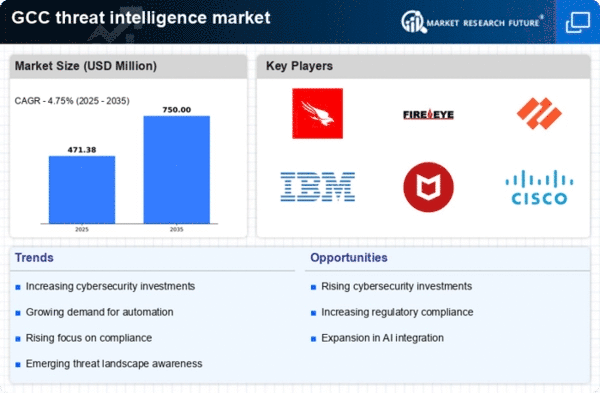Rising Cyber Threats
The escalation of cyber threats in the GCC region is a primary driver for the threat intelligence market. As organizations increasingly rely on digital infrastructure, the frequency and sophistication of cyberattacks have surged. Reports indicate that cybercrime costs are projected to reach $10.5 trillion annually by 2025, underscoring the urgency for robust threat intelligence solutions. This environment compels businesses to invest in advanced threat detection and response capabilities, thereby propelling the demand for threat intelligence services. The threat intelligence market is witnessing a shift towards proactive measures, with organizations seeking to anticipate and mitigate potential threats before they materialize. Consequently, the need for real-time threat intelligence feeds and analytics is becoming paramount, as companies strive to safeguard their assets and maintain operational continuity.
Increased Digital Transformation
The ongoing digital transformation across various sectors in the GCC is significantly influencing the threat intelligence market. As businesses adopt cloud computing, IoT, and other digital technologies, they inadvertently expand their attack surfaces. This transformation has led to a surge in cyber threats, prompting organizations to seek advanced threat intelligence solutions. The threat intelligence market is responding to this demand by offering tailored services that address the unique challenges posed by digital environments. According to market analysis, the GCC cloud computing market is expected to grow at a CAGR of 25% from 2021 to 2026, further emphasizing the need for robust threat intelligence frameworks. Organizations are increasingly aware that integrating threat intelligence into their digital strategies is crucial for safeguarding sensitive data and ensuring business continuity in an evolving threat landscape.
Regulatory Compliance Requirements
In the GCC, stringent regulatory frameworks are emerging, mandating organizations to adopt comprehensive cybersecurity measures. Compliance with regulations such as the UAE's Data Protection Law and Saudi Arabia's Cybersecurity Framework necessitates the integration of threat intelligence solutions. Organizations are increasingly recognizing that failure to comply can result in hefty fines and reputational damage. As a result, the threat intelligence market is experiencing heightened demand for services that assist in meeting these regulatory requirements. Companies are investing in threat intelligence platforms that provide insights into compliance-related threats and vulnerabilities. This trend is expected to drive market growth, as organizations prioritize compliance as a critical component of their cybersecurity strategy. The proactive identification of regulatory risks through threat intelligence is becoming essential for maintaining trust and credibility in the eyes of stakeholders.
Investment in Advanced Technologies
The GCC region is witnessing a surge in investment in advanced technologies, which is significantly impacting the threat intelligence market. Organizations are increasingly adopting AI, machine learning, and big data analytics to enhance their cybersecurity capabilities. These technologies enable businesses to process vast amounts of data and identify potential threats in real-time. The threat intelligence market is evolving to incorporate these advanced technologies, providing organizations with sophisticated tools for threat detection and response. As companies recognize the value of leveraging technology to combat cyber threats, the demand for integrated threat intelligence solutions is expected to rise. Reports suggest that the AI in cybersecurity market is projected to reach $46 billion by 2027, indicating a robust growth trajectory that will likely benefit the threat intelligence market as well.
Growing Awareness of Cybersecurity Risks
There is a notable increase in awareness regarding cybersecurity risks among organizations in the GCC. This heightened awareness is driving the demand for threat intelligence solutions, as businesses recognize the potential impact of cyber threats on their operations. The threat intelligence market is benefiting from this trend, as organizations seek to enhance their cybersecurity posture through informed decision-making. Educational initiatives and government campaigns are contributing to this awareness, leading to a more proactive approach to cybersecurity. Companies are investing in threat intelligence services that provide insights into emerging threats and vulnerabilities, enabling them to implement effective risk management strategies. This growing consciousness about cybersecurity risks is likely to sustain the momentum of the threat intelligence market, as organizations prioritize investments in protective measures.
















